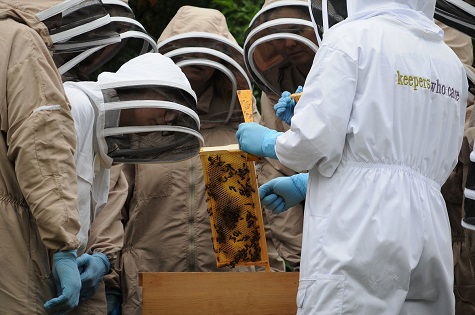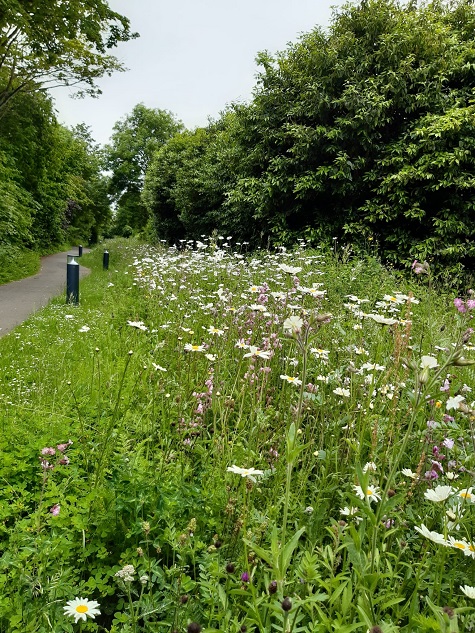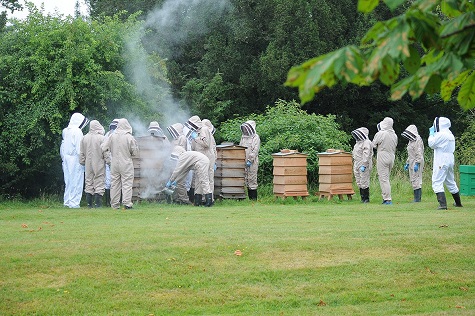Apiculture, or beekeeping as its more commonly known, has been a quintessential part of the UK countryside for decades.
Honeybees play a pivotal role in pollination, which directly impacts agricultural productivity, and the wider bio-diversity of our landscape. Well known for their honey and wax, they are a perceived symbol of health, vitality and diversity wherever you see a beehive. And in recent years have enjoyed a resurgence in popularity in urban areas and across commercial sites.
DAVE TAYLOR, environment and innovation manager, Nurture Group, explores the current situation in relation to Beehives on commercial properties and within our cityscapes.

There are more than 260 species of bee in the UK, 24 bumblebees and over 240 species of solitary bee, as well as the most famous of all, the honeybee. Bees are amongst a wider group of pollinating insects, but they are one of the most prolific, performing about 80% of all pollination worldwide. According to Greenpeace, seventy out of the top one hundred food crop species we grow are pollinated by bees.
The Challenges of Unsustainable Bee Installations
At Nurture we have been providing and supporting honeybees across a variety of our client sites for the past 15 years. We have witnessed first hand the increasing trend and “fashion” to have a hive, and often a request for a beehive is followed by “we want to improve the biodiversity on our property”. A well-meaning but unfortunately inaccurate statement, which requires a little further understanding.
Whilst its true honeybees do support biodiversity, they themselves are essentially a large single species colony, with a huge appetite for forage, a term referring to the essential pollen and nectar, (amongst other elements) honeybees require to sustain the colony. In the right location the hive can sit harmoniously alongside the wider environment and provide a great platform to showcase an array of sustainable practices and engagement. In the wrong location however, a hive can impact negatively to other pollinators such as the bumble and solitary bees. A key understanding in managing the balance, is looking at the wider impact honeybees have on the monoculture around the hive, flying up to three miles from the hive and with colonies potentially growing to more than 70,000 in number in the summer. Wrongly located hives can quickly consume forage to levels too low to sustain other pollinators leading to risks of single species dominance and creating the exact opposite affect initially hoped for.
Our larger cities, have for some time now, become increasingly impacted by this issue, none more so than Greater London - with numbers of hives more than doubling over the past 10 years. Initial concerns over bees in London started to be raised in 2017, further studies and a report published in 2020 by Kew Gardens confirmed the impact honeybees are having on other pollinating species. In addition to the bee species discussed above, there are some 2,200 species of butterflies and moths and more than 7,000 species of beetles, flies and wasps. Many locations in Greater London can no longer support honeybees because of the limited amount of forage available.
This trend is increasing not only in other UK cities, but across Europe and North America.

The London Beekeepers Association (LBKA) said it had found that many businesses in the city were gradually reducing the number of hives on rooftops or removing them altogether and is calling for more responsible beekeeping. So called ‘bee-washing’ as part of ESG branding needs to end. As Richard Glassborough, president of the LBKA, said: “The misinformed ‘save the bees’ narrative that still preaches the decline of honey bees, despite overwhelming evidence that honey bee numbers are not declining and probably never will. It has not decreased, certainly not in Britain, it is difficult to eliminate it.”
It’s crucial that companies continue to support the benefit honeybees can bring in the right setting. Since the 2020 report we ourselves ceased installation of hives in London. During 2023 we declined more than 215 hive requests in London and other parts of the UK. Instead, the way forward is through adapting new landscaping practices to increase biodiversity and increasing education on how beekeeping can and should be done sustainably. This means creating bee-friendly rooftop gardens and habitats for wild bees in urban areas and moving towards planting pollinator-friendly flowers instead of adding hives.
This adaption of the landscape, in conjunction with leading organisations such as Buglife, Plantlife and the Wildlife trust, is resulting in not only a reprieve for pollinators and other insects but an award-winning service.
The Importance of Bee-Friendly Landscaping
Commercial properties can incorporate native flowering plants, trees, and shrubs that provide a diverse and continuous supply of nectar and pollen throughout the seasons. Creating bee friendly habitats can include simple steps such as growing organically to avoid the use of any harmful chemicals, choosing plants that attract bees including plenty of native species and planting wildflowers and diverse flowering plants. Furthermore, it is important to make sure the bee habitat is in bloom all year round, so there is nectar for bees every season. Leaving lawn areas un-mowed for ground-dwelling bees is also important. Good practice involves conducting initial biodiversity impact assessments when taking on a new site, looking at and collaborating with the client to identify gaps in flowering periods, potential habitat provision and methods for improving and creating a greater diversity in the landscape through simple changes or adaptions in maintenance.

Education and Community Outreach Matters
Why install a beehive at all you might ask, in light of understanding the impacts within our built environment?
Beehives in the right location provide a fantastic piece as part of wider initiatives in engaging employees, clients, and the local community in understanding how they can support biodiversity in their home, challenge long standing misconceptions. They can also provide insights into the world of pollinators, and as we see an increasing urban based population, give knowledge of our green spaces. We have supported more than 7,000 people at our “meet the bees” workshops. Allowing participants to put on bee suits and get up close and personal with the bees.

Our teams visit schools and local community hubs to carry out talks and educational engagement using the honeybee as a vehicle to pass the message of the importance of pollinators, and our honey workshops allow attendees to see how honey comes from the hive, discuss food ethics and to give understanding of what is actually in the jar.
Nurture’s honeybee programme is supported by a network of inhouse trained beekeepers, using our own internal Lantra college. Oour Master Keeper John Beavan, developed and accredited our NVQ qualification, ensuring we can provide experienced and knowledgeable support where it is needed.
Sustainable and responsible beekeeping on commercial properties is a tangible way to contribute to environmental conservation and promote biodiversity. Although there can be challenges when beekeeping is not done in a sustainable manner, we should continue to promote biodiversity and create the right habitats for bees where they can thrive.